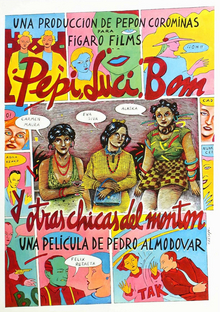
Very soon, this place will be full of murderesses, drug addicts, prostitutes, just like before. Cabaret singer Yolanda (Cristina Sanchez Pascual) brings heroin to her lover who drops dead of an overdose. To escape from the police who arrive looking for her at the club where she works, the singer looks for refuge in a local convent where the Mother Superior (Julieta Serrano), a fan of Yolanda, rapturously greets her. The mission of the order, called the Humiliated Redeemers (Redentoras humilladas), is to offer shelter and redemption to fallen women. The convent once was a bustling haven for prostitutes, drug addicts and murderers, but it is now in disrepair. The order is facing serious financial hardships as their prime financial supporter, the vain and greedy Marchioness aka La Marquesa (Mary Carrillo), has decided to discontinue the convent’s annuity under the pretence of economising. The convent had taken in their wayward daughter Virginia who became a nun and ran off to Africa where she was eaten by cannibals. Six religious members of the community live at the convent: the mother Superior, four other nuns and the chaplain. To reinforce their vows of humility, the Mother Superior has given the other nuns repulsive new names: Sister Manure (Marisa Paredes), Sister Damned (Carmen Maura), Sister Snake (Lina Canalejas) and Sister Sewer Rat (Chus Lampreave). With few opportunities for spiritual ministry, the nuns have begun to indulge in their own idiosyncratic pursuits in order to pass the time. The nurturing Sister Damned compulsively cleans the convent and coddles all the animals under her care, including an overgrown pet tiger that she treats like a son, playing the bongos for him. Ascetic Sister Manure is consumed by thoughts of penitence and corporal self-sacrifice and cooks between LSD hallucinations. She murdered somebody and because the mother superior lied under oath to save her from jail she is devoted to her. The over-curious Sister Sewer Rat gardens and secretly under the pen name ‘Concha Torres’ writes lurid novels about the wayward souls who visit the convent. She smuggles the novels out of the convent through her sister’s regular visits. The unassuming Sister Snake, with the help of the priest (Manuel Zarzo) tailors seasonal fashion collections for dressing the statues of the Virgin Mary. Her piety is a cover for her romantic love for the chain-smoking chaplain. The mother Superior is a heavy drug user and a Lesbian, whose charitable work is a means of meeting needy young women of whom she says, From admiring them so much I have become one of them. At the convent, Yolanda mingles with the nuns and the Mother Superior soon falls passionately in love with her. Together, they consume coke and heroin until Yolanda decides both should come off the drugs. Withdrawal from the drug for Yolanda is like a painful catharsis but for the Mother Superior it confirms her very sinful nature. Yolanda keeps the Mother Superior at arm’s length and strikes a friendship with Sister Rat. The Mother Superior has to face both Yolanda’s rejection and the threats of closure … One of the bases of our community is self-mortification and humiliation. That’s why we have such bizarre-sounding names. Overdosing, Lesbian nuns, hard drugs, erotic novels. Not the best known of Pedro Almodovar’s films or even among his own favourites, principally because as critic Jose Arroyo points out, it was made more or less on commission, the first commercially produced among his body of work made by a multimillionaire for his actress girlfriend – this film’s leading lady. Notwithstanding that, this boasts a familiar cast that includes Eva Siva and Cecilia Roth in the ensemble with Maura making one of her five appearances for the director. Aren’t you a nun?/No, I’m a whore. The main storytelling issue is the passivity of the protagonist, something that led the writer/director to give the nuns more to do which is where the real fun happens. Nothing to do with the later Whoopi Goldberg movie Sister Act although there’s a certain broad familiarity, perhaps if this had gone the whole hog and been turned into a musical Almodovar might have achieved something closer to his ambitions. The uneven structure resulting from the unbalanced construction isn’t entirely satisfying and it leads to a bittersweet conclusion that feels rather abrupt. Never mind, we’ll never get over seeing these singularly human nuns with their loves and lusts and extremely bad habits! Eating this is like taking communion. Jesus appeared to me while I was making it. He offered me his wounds to suck, like a swallow
